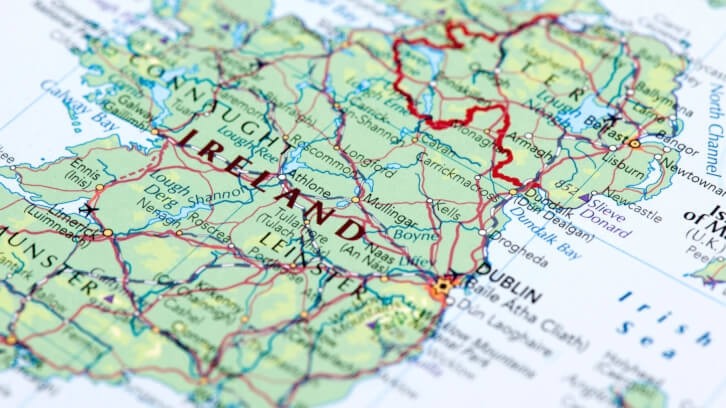Feature
‘Not for EU’ – a done deal or will common sense prevail?

It’s been just over a year since the UK and EU agreed the Windsor Framework, a set of new arrangements supposedly designed to smooth the flow of trade between Great Britain (GB) and Northern Ireland (NI) whilst safeguarding NI’s place in the Union.
At the time it was claimed that the new arrangements, to be phased in from October 2023, would significantly reduce the administrative burden on businesses, by reducing formalities, checks and controls on goods moving across the Irish Sea. But in the months that have ensued, businesses have found themselves grappling with a plethora of seemingly ever-changing abbreviations and vague terminologies, whilst desperately seeking answers to the complexities the new processes present.
Navigating the lanes
A fundamental part of the Windsor Framework is what is known as the Northern Ireland Retail Movement Scheme (NIRMS). This is a replacement for the Scheme for Temporary Agrifoods Movements into Northern Ireland (STAMNI). Whilst some paperwork is still required, this system effectively allows Sanitary and Phyto-Sanitary (SPS) goods intended for final consumption in NI to pass through a ‘green lane’ system, removing ‘unnecessary’ export health certificates and routine checks, in favour of a ‘risk-based’ and ‘intelligence-led’ approach. Any physical checks will now be based on risk assessments conducted by UK authorities and will target abuse of the new arrangements or specific risks to animal, plant, or human health. There is no need for an official veterinarian or plant health inspector to approve the documentation and instead, the goods move on the basis of a trader declaration under the authorisation of the UK competent authority.
However, goods which aren’t intended for final consumption or use in NI, or those which may also be intended for the Republic of Ireland (RoI)/EU market must go through a ‘red lane’ system and consequently, whilst not needing the new labelling, have to comply with all EU documentary requirements and checks.
So, it sounds like a no-brainer, doesn’t it? Well, as we’ve come to realise, such ‘easements’ don’t come without condition. Firstly, to use the green lane, traders need to be a ‘listed establishment’, more commonly referred to as a ‘trusted trader’ or ‘authorised operator’. Consignments also still require some paperwork in the form of a ‘General Certificate’ detailing the sender, recipient, and transporter as well as the place of dispatch, destination, and the proposed entry point into NI. The consignment then needs to be sealed with an official seal approved by the competent authority.
Furthermore, a key requirement is that, in exchange for the reduced formalities, and to protect against onward movement into the Republic of Ireland (RoI) and EU, the Union requires the goods to be individually labelled with the words ‘Not for EU’.
Not for EU labelling rollouts
October 2023 saw the first phase of ‘Not for EU’ labelling being introduced, on all prepacked meat and meat products and some dairy. Phase 2 will take place in October 2024, with the remaining dairy having to be labelled, followed by Phase 3 in July 2025 for pet food, fruit and vegetables, fish, and composite products.
Whilst each of the phases do have a ‘transition period’, it is extremely short. Disappointingly, industry only have 30 days from the start of each phase, after which point, any retail product placed onto the market must carry the new labelling. There is, however, an allowance for goods which have already been placed on the market prior to their respective phase, as these will be allowed to be sold until stocks are exhausted.
The problem with Not for EU
But the move has been met with heavy criticism from traders as they seek to find workable solutions. Many have questioned the costs associated with meeting the green lane requirements, including the generation of multiple labels, increased storage and handling. While hauliers have been left concerned about the impracticalities it presents.
Some have decided that having two different sets of labels, one for goods destined to remain on the NI market and another for the very same goods to be placed on the EU market simply isn’t feasible, and they’ve had no option other than to bypass NIRMS in favour of the red lane. For others, sadly, it has meant the end of the road as supply to certain markets becomes unviable.
Consumers have also been left confused and many have taken to social media channels to vent their anger upon learning the product they’ve purchased is ‘Not for the EU’. Cue the ‘What’s wrong with it?’ and ‘Is it lower quality?’ queries, and also protests of ‘It’s not good enough for the EU but good enough for us!’.
But the worst is yet to come
As it stands, from October 2024, when phase 2 starts, the ‘Not for EU’ labelling requirement will be extended to all the same products placed on the GB market. Even goods imported directly into GB from the EU or rest of world (RoW), or produced by businesses who do not currently trade with NI will have to be compliant with this new labelling requirement.
EU and RoW businesses who currently export products to GB with multilingual labels will also now be faced with producing a bespoke label purely for the GB market. Just how, with all this added complexity, can we possibly be seen as an attractive trading partner, one must ask.
And as if that wasn’t enough, the words won’t be required on goods produced in NI for any market. Due to what is known as Unfettered Market Access rules, qualifying goods moving from NI to the GB market will not be required to be labelled with the words ‘Not for EU’ so if the consumer isn’t already confused, you can guarantee come October they will be!
Make no mistake, this isn’t an EU stipulation under the terms of the Windsor Framework but rather an ill-thought through, politically led decision, the basis of which, according to the recent Government consultation, is ‘to ensure no incentive arises for businesses to avoid placing goods on the NI market’.
It’s still early days, so just how much the green lane will be used to trade with NI remains to be seen. The likelihood is that unless they are forced to do so, many will use the red lane so that their goods will comply with EU laws and can be sold across NI, RoI, and EU markets. Only time will tell if the system does work and lives up to the Government’s pitch. And in the meantime, industry face yet another wait to hear the outcome of the consultation to extend the requirement to goods on the GB market.
Whilst many feel it’s already be a done deal, we can only hope that our voices have been strong enough, they have listened and acted on our concerns, and common sense will prevail.
















